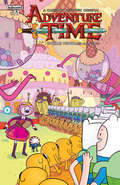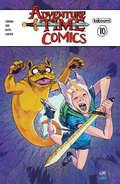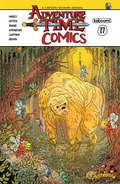- Table View
- List View
Adventure Time (Planet of the Apes #7)
by Pendleton Ward<p>JOIN JAKE THE DOG AND FINN THE HUMAN AS THE HOTTEST ALL-AGES COMIC BOOK ON THE STANDS CONTINUES! The totally mathematical adventure continues in this latest time-bending issue of ADVENTURE TIME! <p>This is a fixed-format ebook, which preserves the design and layout of the original print book.</p>
Adventure Time (Planet of the Apes #70)
by Pendleton Ward<p>Double Troubles, Part 1 of 4! Finn and Jake take the day off from adventuring to enjoy a new carnival, where a witch offers to make them free doubles, twice the Finn and Jake fun! <p>This is a fixed-format ebook, which preserves the design and layout of the original print book.</p>
Adventure Time (Planet of the Apes #71)
by Pendleton Ward<p>Double Troubles, Part 2 of 4! While the real Finn and Jake live it up at the amusement park, their doubles are making the Candy Kingdom better than ever. Is this too good to be true? <p>This is a fixed-format ebook, which preserves the design and layout of the original print book.</p>
Adventure Time (Planet of the Apes #72)
by Pendleton Ward<p>Doubles Trouble” Part 3 of 4. While Finn and Jake to take down an army of doubles, their other doubles have taken over the Candy Kingdom! <p>This is a fixed-format ebook, which preserves the design and layout of the original print book.</p>
Adventure Time (Planet of the Apes #73)
by Kevin Cannon Joey McCormick Maarta Laiho<p>Finn and Jake might have finally figured out a way to get rid of their doubles… but what do they do when everyone else likes the doubles more? <p>This is a fixed-format ebook, which preserves the design and layout of the original print book.</p>
Adventure Time (Planet of the Apes #74)
by Jorge Monlongo Maarta Laiho Conor McCreery<p>Magic Man is causing all of Ooo to lose its color! Only the brave hero holding this book has the power to bring color back to Ooo and set everything right before Finn, Jake, and everyone else is in black-and-white forever! Special coloring book issue! <p>This is a fixed-format ebook, which preserves the design and layout of the original print book.</p>
Adventure Time (Planet of the Apes #75)
by Ryan North Mariko Tamaki Christopher Hastings Braden Lamb Shelli Paroline Maarta Laiho Ian McGinty Zachary SterlingFollow the story of Ooo from the past, present, and future in this oversized final issue! At the wedding of Jake’s granddaughter, Jake, Finn, and the residents of Ooo reminisce on the long path that took them here, remembering friends, enemies, and those who fall somewhere in between.
Adventure Time (Planet of the Apes #8)
by Pendleton Ward<p>THE MOST POPULAR AND TOTALLY RHOMBUS ALL-AGES COMIC AVAILABLE TODAY! Join Jake the Dog and Finn the Human in another awesome issue of this all-ages classic! With Ooo in the grips of a Jake-caused time paradox, there's only one team that can set things right. Don't miss the latest issue of the comic adaptation of the hit Cartoon Network show! <p>This is a fixed-format ebook, which preserves the design and layout of the original print book.</p>
Adventure Time (Planet of the Apes #9)
by Pendleton Ward<p>BRAND-NEW STORY ARC! PERFECT JUMPING-ON POINT FOR NEW READERS! Join Jake the Dog and Finn the Human as they try to right the wrongs of a Jake-caused TIME PARADOX! If you haven't checked out the comic adaptation of the hit Cartoon Network show, there's no better time to jump into the all-ages sensation! <p>This is a fixed-format ebook, which preserves the design and layout of the original print book.</p>
Adventure Time (Uncle Grandpa #38)
by Pendleton WardEveryone is hungry, but there isn't enough food to go around. Things get a little dicey as Finn and Jake try to figure out what is up with their friends, and why does this little witch keep coming back? Glob, she's really persistent.
Adventure Time 2013 Spoooktacular (Planet of the Apes #1)
by Pendleton Ward<p>The Spooktacular is a collection of short stories following some of our favorite friends in ADVENTURE TIME. Enjoy Marceline's attempt at being a "good girl", how Fionna and Cake get through their latest adventure and other stories! It's going to be a great time! <p>This is a fixed-format ebook, which preserves the design and layout of the original print book.</p>
Adventure Time 2014 Annual Special: Baby Cakes (Planet of the Apes #1)
by Ian McGinty Fred Stresing Frank Gibson Becky DreistadtCake is a sweet little kitten gettin' into magical mischief with her best friend...little adventurer Fionna! A very special issue by dynamite creators Becky Dreistadt and Frank Gibson bring you the cutest thing imaginable...Baby Fionna and Cake!
Adventure Time 2015 Spoooktacular (Planet of the Apes #2)
by Pendleton Ward<p>There's no better way to celebrate Halloween than with a self-contained story about Marceline the Vampire Queen set during the? summer? Ah well, you get the idea! What's even better is that this one-shot is written and illustrated by Hanna K., a storyboard artist for the Adventure Time animated series! If you've ever wondered what Marceline was like before she became a vampire, here's your chance to find out! In this oversized, self-contained tale that takes place before she was "turned," we learn all about Marceline's backstory and find out how she became the Vampire Queen she is today! <p>This is a fixed-format ebook, which preserves the design and layout of the original print book.</p>
Adventure Time 2016 Spoooktacular (Planet of the Apes #3)
by Pendleton Ward<p>Our annual Halloween tradition for Adventure Time continues with this brand-new collection of spooky short stories! There's nothing more terrifying in Ooo than...a penguin?? That's right! Gunter, the most evil being in the Land of Ooo, takes center stage! 40 pages of story and art. <p>This is a fixed-format ebook, which preserves the design and layout of the original print book.</p>
Adventure Time 2017 Spoooktacular (Planet of the Apes #4)
by Pendleton Ward<p>To celebrate Halloween, it's a collection of fresh new shorts starring everyone's favorite malevolent mint, Peppermint Butler! Whether he's resorting to dark magick to launder his bow tie or fighting in the War of the Magicians, Pep Buts is the most tireless butler in Ooo. And in the land of Aaa, Butterscotch Butler is determined to keep Prince Gumball's spooky masquerade safe from Marshall Lee's tricks! <p>This is a fixed-format ebook, which preserves the design and layout of the original print book.</p>
Adventure Time Comics (Adventure Time Comics #1)
by Pendleton Ward<p>Oh My Glob! We've unleashed some of the industry's best cartoonists loose in the Land of Ooo to share their most algebraic stories in their own voices! The first issue is so math thanks to Katie Cook (My Little Pony: Friendship is Magic), Tony Millionaire (Sock Monkey), and Art Baltazar (Patrick the Wolf Boy). You're lumping welcome! This ongoing series will feature radical stories from Jeffrey Brown (Darth Vader and Son), Terry Moore (Strangers in Paradise), Kelly Thompson (Jem and the Holograms), Box Brown (Andre The Giant), and more! <p>This is a fixed-format ebook, which preserves the design and layout of the original print book.</p> <P><P> <i>Advisory: Bookshare has learned that this book offers only partial accessibility. We have kept it in the collection because it is useful for some of our members. Benetech is actively working on projects to improve accessibility issues such as these.</i>
Adventure Time Comics (Adventure Time Comics #10)
by Pendleton Ward<p>Finn and Jake try to find a challenging new quest, Marceline helps Princess Bubblegum deal with her haunted lab, and BMO wants to see what the big deal about 3-D is. <p>This is a fixed-format ebook, which preserves the design and layout of the original print book.</p> <P><P> <i>Advisory: Bookshare has learned that this book offers only partial accessibility. We have kept it in the collection because it is useful for some of our members. Benetech is actively working on projects to improve accessibility issues such as these.</i>
Adventure Time Comics (Adventure Time Comics #11)
by Pendleton Ward<p>Finn and Jake face off in the ultimate showdown, Tree Trunks forgets how to bake pies, and Marceline gets lost in her own home. <p>This is a fixed-format ebook, which preserves the design and layout of the original print book.</p> <P><P> <i>Advisory: Bookshare has learned that this book offers only partial accessibility. We have kept it in the collection because it is useful for some of our members. Benetech is actively working on projects to improve accessibility issues such as these.</i>
Adventure Time Comics (Adventure Time Comics #12)
by Pendleton Ward<p>Finn and Jake get lost. PB and Marceline try a cooking class that goes bad. Finn tries his hand at being a princess. <p>This is a fixed-format ebook, which preserves the design and layout of the original print book.</p> <P><P> <i>Advisory: Bookshare has learned that this book offers only partial accessibility. We have kept it in the collection because it is useful for some of our members. Benetech is actively working on projects to improve accessibility issues such as these.</i>
Adventure Time Comics (Adventure Time Comics #13)
by Pendleton Ward<p>During a game of hide and seek, Finn finds himself lost in the land of the Forgotten. In another tale, we find the unlikeliest of heroes united to save Finn and Jake: Magic Man and Tiny Manticore! <p>This is a fixed-format ebook, which preserves the design and layout of the original print book.</p> <P><P> <i>Advisory: Bookshare has learned that this book offers only partial accessibility. We have kept it in the collection because it is useful for some of our members. Benetech is actively working on projects to improve accessibility issues such as these.</i>
Adventure Time Comics (Adventure Time Comics #14)
by Pendleton Ward<p>Wally Wando sends Finn and Jake to fight their greatest opponents and Flame Princess kidnaps Finn and Jake on Princess Bubblegum's birthday. <p>This is a fixed-format ebook, which preserves the design and layout of the original print book.</p> <P><P> <i>Advisory: Bookshare has learned that this book offers only partial accessibility. We have kept it in the collection because it is useful for some of our members. Benetech is actively working on projects to improve accessibility issues such as these.</i>
Adventure Time Comics (Adventure Time Comics #15)
by Pendleton Ward<p>Fed up with being called cute, BMO enlists Princess Bubblegum to help her build a buff robot bod, and Jake drags Finn to the Goblin Kingdom to witness an underground Goblin thumb-wrestling match. <p>This is a fixed-format ebook, which preserves the design and layout of the original print book.</p> <P><P> <i>Advisory: Bookshare has learned that this book offers only partial accessibility. We have kept it in the collection because it is useful for some of our members. Benetech is actively working on projects to improve accessibility issues such as these.</i>
Adventure Time Comics (Adventure Time Comics #16)
by Pendleton Ward<p>Simon and young Marcie have to repair Hambo's arm, and we hear the tale of how a goose became a Choose Goose. <p>This is a fixed-format ebook, which preserves the design and layout of the original print book.</p> <P><P> <i>Advisory: Bookshare has learned that this book offers only partial accessibility. We have kept it in the collection because it is useful for some of our members. Benetech is actively working on projects to improve accessibility issues such as these.</i>
Adventure Time Comics (Adventure Time Comics #17)
by Pendleton Ward<p>Birthdays are celebrated, Marceline gets lumpy, and an underground city is revealed! <p>This is a fixed-format ebook, which preserves the design and layout of the original print book.</p> <P><P> <i>Advisory: Bookshare has learned that this book offers only partial accessibility. We have kept it in the collection because it is useful for some of our members. Benetech is actively working on projects to improve accessibility issues such as these.</i>
Adventure Time Comics (Adventure Time Comics #18)
by Pendleton Ward<p>Finn and Jake have way too much stuff! Turns out that years of looting dungeons and adventuring adds up. Time for the biggest yard sale in all of Ooo! <p>This is a fixed-format ebook, which preserves the design and layout of the original print book.</p> <P><P> <i>Advisory: Bookshare has learned that this book offers only partial accessibility. We have kept it in the collection because it is useful for some of our members. Benetech is actively working on projects to improve accessibility issues such as these.</i>
























